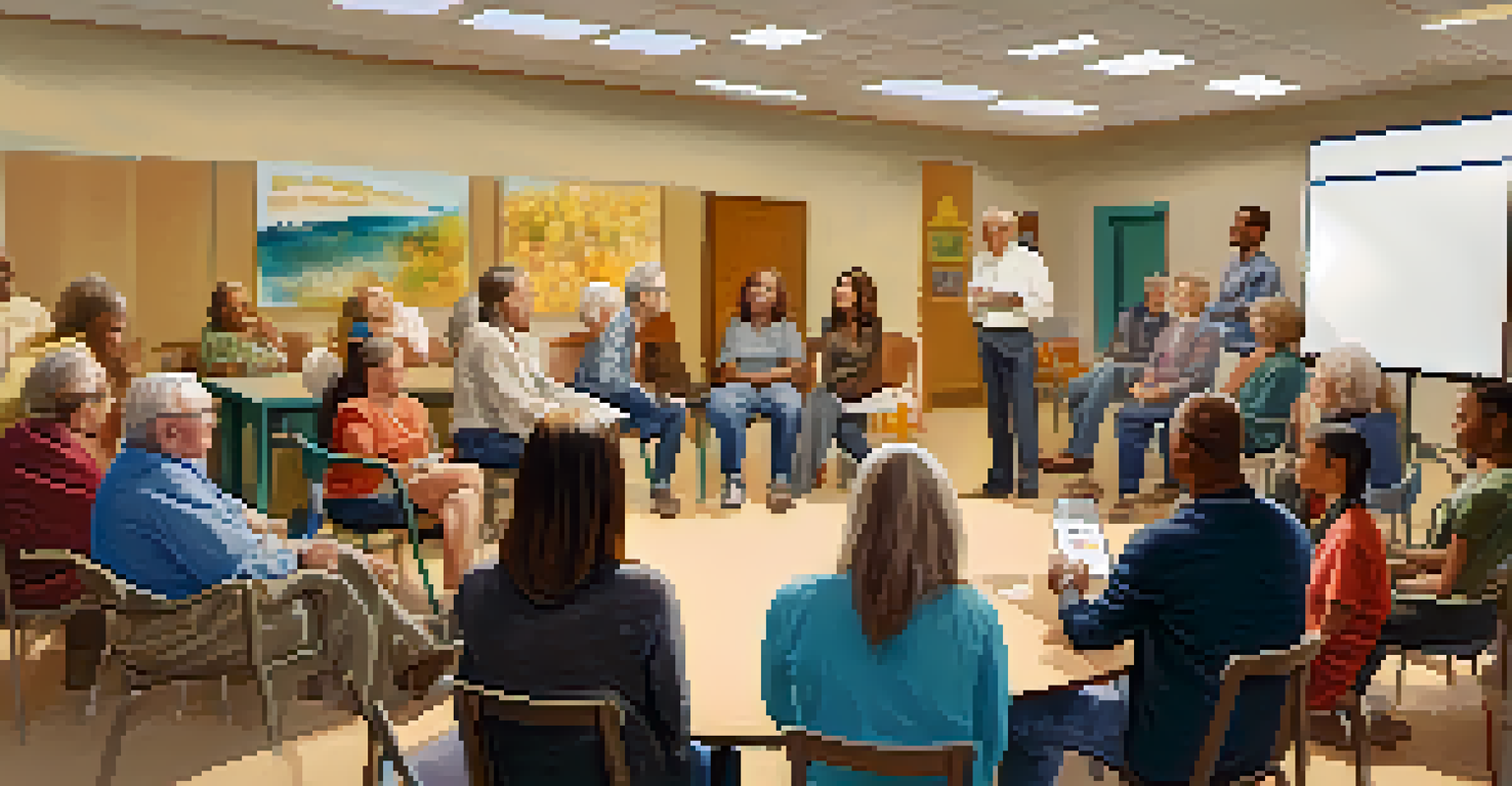Understanding Community Engagement in Homeowners Associations

Defining Community Engagement in HOAs
Community engagement in Homeowners Associations (HOAs) refers to the active participation of residents in the decision-making processes and activities that shape their neighborhood. This involvement can range from attending meetings to volunteering for committees, ensuring that every voice is heard. When residents engage with their HOA, they contribute to creating a vibrant and cooperative community.
A community is like a ship; everyone ought to be prepared to take the helm.
For many, HOAs represent more than just a set of rules; they embody a shared vision for the community. By participating, homeowners can help influence policies and initiatives that directly affect their living environment. This engagement fosters a sense of ownership and pride, transforming a neighborhood into a true community.
Moreover, effective community engagement can lead to better communication between residents and HOA boards. When homeowners feel comfortable sharing their ideas and concerns, it can lead to improved trust and collaboration, ultimately enhancing the overall living experience.
The Benefits of Active Participation
Active participation in HOAs offers numerous benefits, both for individuals and the community as a whole. Engaged residents are more likely to be informed about local issues, developments, and opportunities for improvement. This awareness can empower homeowners to make better decisions that positively impact their neighborhood.

In addition to providing a platform for sharing ideas, community engagement fosters social connections among residents. When neighbors come together for meetings or events, they build relationships that make the community stronger. These connections often lead to increased cooperation and support in times of need.
Community Engagement Builds Ownership
Active participation in HOAs fosters a sense of ownership and pride among residents, transforming neighborhoods into vibrant communities.
Furthermore, active participation can help streamline HOA operations. When residents are involved, they can provide valuable feedback that leads to more effective governance and planning. This can reduce misunderstandings and disagreements, making the community a more harmonious place to live.
Barriers to Community Engagement
Despite the benefits, many homeowners face barriers to engaging with their HOA. Some may feel intimidated by formal meetings or unsure about how to voice their opinions. Others might believe that their input won't make a difference, leading to disengagement and apathy.
The greatness of a community is most accurately measured by the compassionate actions of its members.
Time constraints also play a significant role in limiting participation. Busy schedules can make it challenging for residents to attend meetings or volunteer for committees. As a result, the voices that are heard may represent only a small portion of the community, which can skew decision-making.
Additionally, communication issues can hinder engagement efforts. If HOA boards fail to effectively convey information about meetings or initiatives, residents may remain uninformed and less likely to participate. Bridging this gap is crucial for enhancing overall community involvement.
Strategies to Encourage Participation
To foster a more engaged community, HOAs can implement various strategies that make participation accessible and appealing. One effective approach is to host informal gatherings, such as neighborhood barbecues or open houses. These events allow residents to connect in a relaxed setting, making it easier to discuss community matters.
Another strategy involves improving communication channels. Utilizing platforms like newsletters, social media, or community apps can help keep residents informed and engaged. Clear, concise updates about meetings and initiatives ensure that homeowners feel connected and aware of happenings in their neighborhood.
Barriers Hinder Resident Involvement
Common obstacles, such as intimidation and time constraints, often prevent homeowners from engaging with their HOAs and voicing their opinions.
Lastly, providing educational resources can empower residents to participate more confidently. Workshops on HOA governance, financial management, or community planning can demystify the processes and encourage more homeowners to contribute their ideas and expertise to the discussion.
The Role of HOA Boards in Engagement
HOA boards play a crucial role in fostering community engagement by creating an inclusive environment where residents feel welcome to participate. This begins with establishing clear communication and setting an approachable tone during meetings. Boards that actively seek input from homeowners demonstrate their commitment to collaboration and transparency.
Moreover, HOA boards can lead by example by participating in community events and showing enthusiasm for resident involvement. When boards prioritize engagement, it encourages homeowners to mirror that enthusiasm, creating a cycle of participation that benefits everyone.
Additionally, boards should be open to feedback and willing to address concerns raised by residents. By actively listening and responding to homeowner input, boards can create a more positive atmosphere where community engagement thrives.
Building a Sense of Community
Community engagement is essential for building a strong sense of belonging among residents. When homeowners participate in decision-making and activities, they cultivate deeper relationships with their neighbors, fostering a supportive environment. This sense of connection can significantly enhance the overall quality of life within the community.
Moreover, engaged residents are more likely to take pride in their neighborhood. This pride often translates to increased property values and a more attractive living environment. When residents feel a sense of ownership, they are motivated to maintain their homes and contribute positively to communal spaces.
Effective Strategies Boost Participation
Implementing informal gatherings and improving communication can significantly enhance community engagement and encourage more residents to participate.
Ultimately, a strong sense of community leads to a more cohesive and resilient neighborhood. Engaged residents are better equipped to address challenges collectively, ensuring the community thrives even in difficult times.
Measuring the Impact of Engagement
To understand the effectiveness of community engagement efforts, HOAs can implement various metrics to measure participation and satisfaction. Surveys are a valuable tool for gauging resident opinions on engagement initiatives and identifying areas for improvement. Regular feedback can guide boards in refining their strategies to better meet homeowners' needs.
Additionally, tracking attendance at meetings and events can provide insights into resident involvement levels. By analyzing this data, HOAs can determine which initiatives resonate most with homeowners and adjust their approaches accordingly. This ongoing assessment helps maintain a dynamic and responsive community.

Lastly, assessing the overall health of the community, including property values and resident satisfaction, can indicate the impact of engagement efforts. A thriving community reflects successful engagement strategies, demonstrating the importance of fostering participation in HOAs.